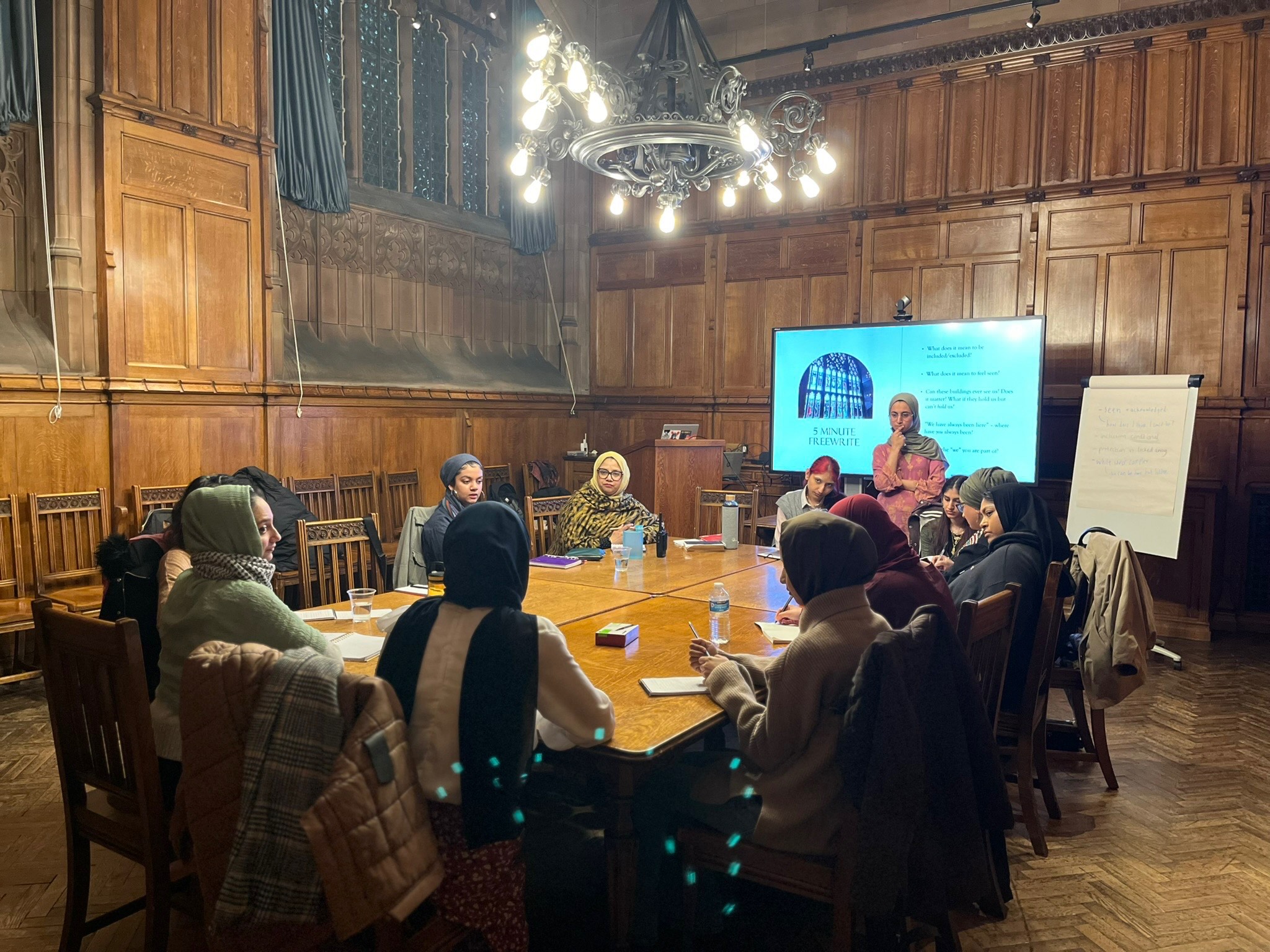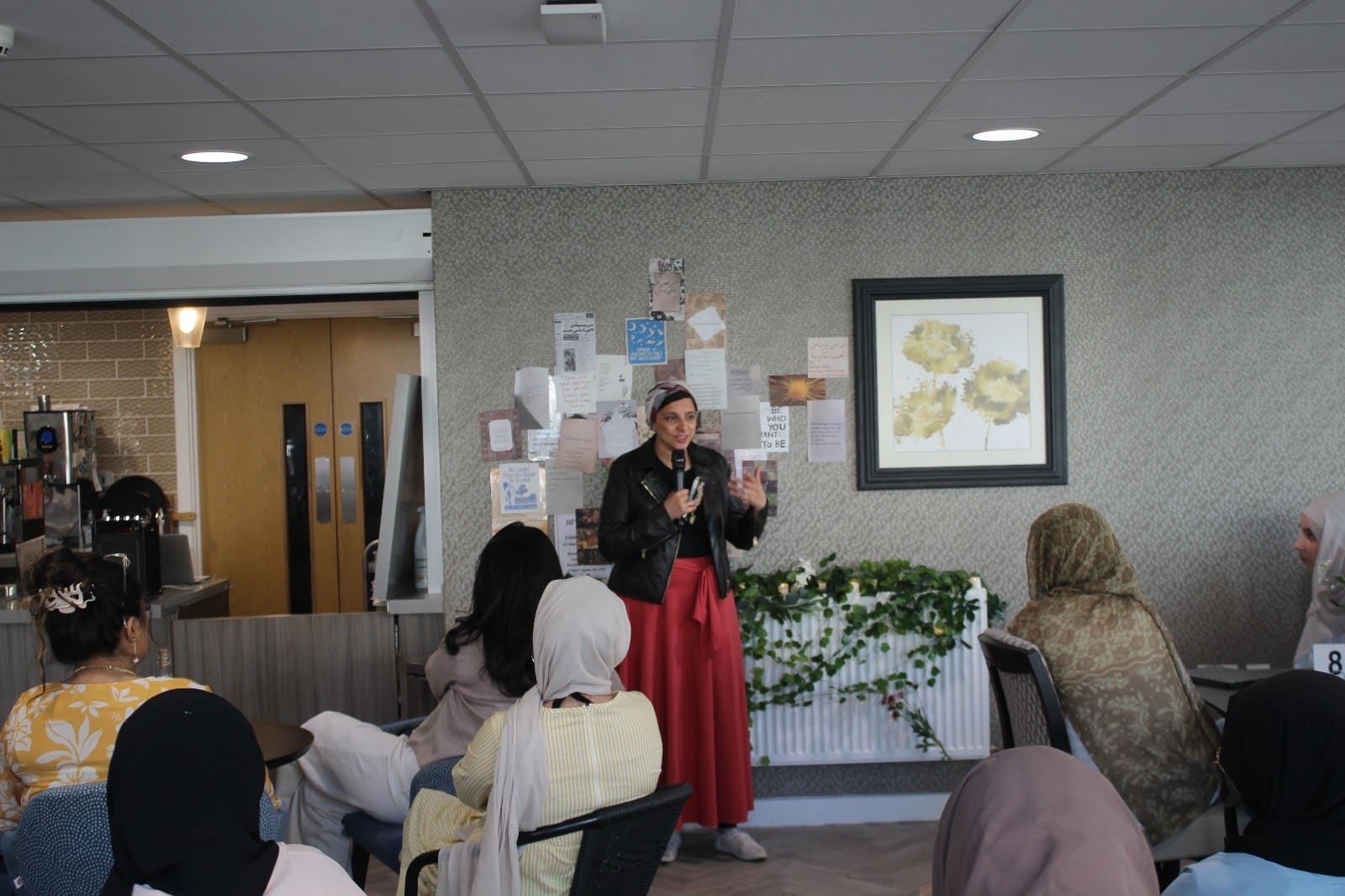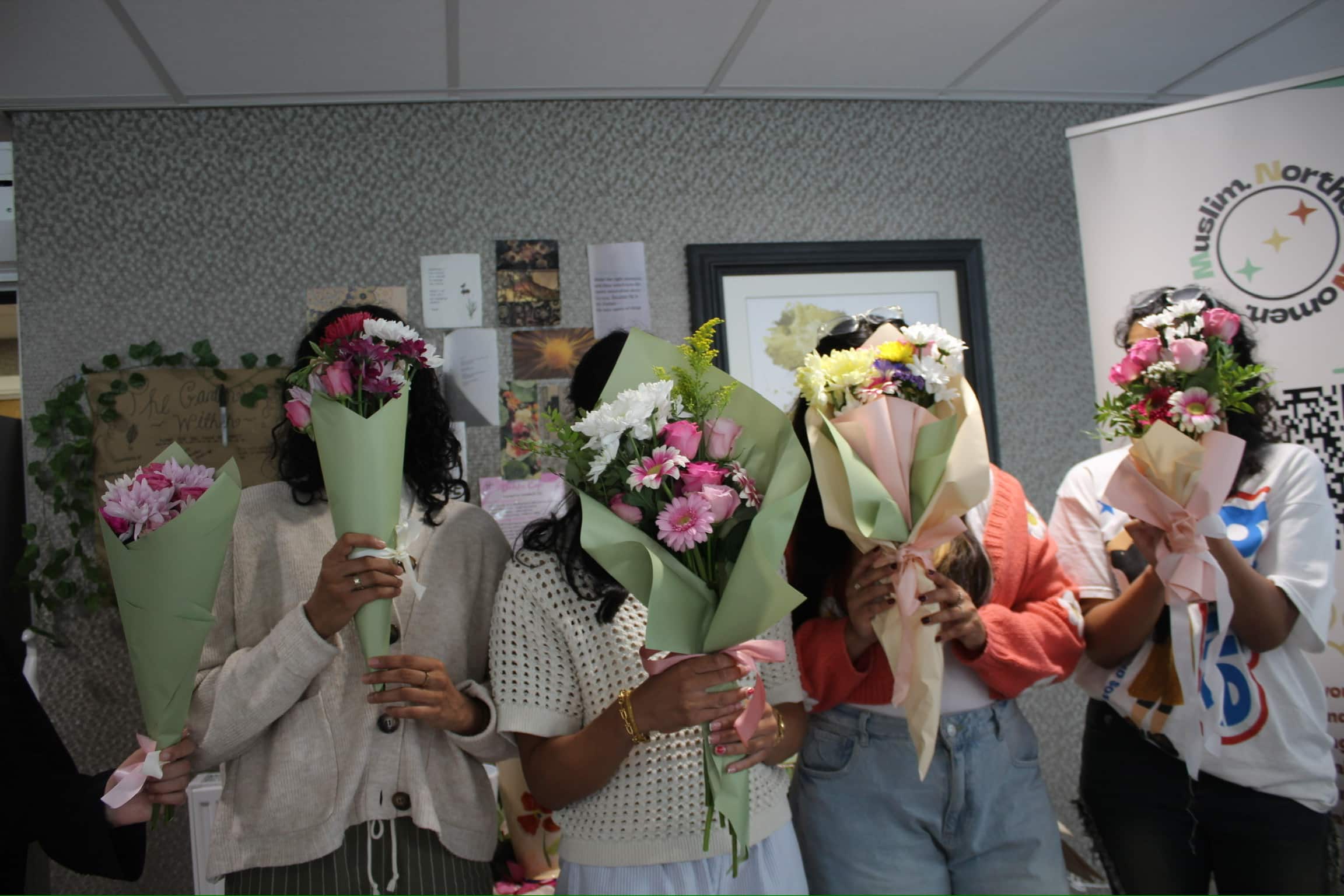Muslim Northern Women is a youth-led organisation building power with young Muslim women and girls in the North of England. They create healing spaces, provide political education, and build allyship to challenge Islamophobia and interconnected injustice.
The organisation was founded in Manchester by a group of young Muslim women shaped by their lived experience of Islamophobia, racism, and exclusion. For Executive Director Roukagia, the turning point came during the Manchester Arena attack in 2017, when she was still at school.
“I was in high school then and sitting my GCSEs. When that attack happened, that’s when the world really changed for me,” she recalls. “Not long before that, I decided I wanted to wear the hijab. I used to be white-passing before, but then immediately my identity really started to change because of the way I was being treated and because of the way I saw a lot of my friends and family being treated as well. That’s where this work all started for me.”
 Those experiences revealed to her how little support existed for Muslim women and girls experiencing Islamophobia, which they define intersectionally and view as “a type of neo-colonial racism that must be addressed through an anti-racist approach across all levels of society.”
Those experiences revealed to her how little support existed for Muslim women and girls experiencing Islamophobia, which they define intersectionally and view as “a type of neo-colonial racism that must be addressed through an anti-racist approach across all levels of society.”
“There’s a major lack of support for Muslim women and Muslim girls in particular when it comes to Islamophobic violence and experiences they’re facing. Sometimes this can be in more direct forms, but other times it’s more subtle, it’s systemic, and it’s much more difficult to identify and talk about. That’s especially true when you’re young and you don’t yet have that political education or that language to describe the experiences you’re going through. But it doesn’t mean you’re not feeling them, or that they’re not traumatic.”
Muslim Northern Women was founded to fill that gap. Its vision is “a future where Muslim women and girls have realised their inner power and are confident in leading change, confronting oppression and building a just society with supportive allies through activism, education and solidarity.”
Their mission is to build that power with young Muslim women and girls, and with allies, through healing spaces, political education and collective organising. “We recognise that Islamophobia doesn’t exist in a silo,” says Roukagia. “It’s a form of racism, part of the wider fight for racial justice, and you can’t have racial justice without economic justice, without gender justice, without disability justice. All oppression is interconnected, and liberation can only be collective.”
Muslim Northern Women use a distinctive approach to working that blends Islamic values with community organising methodologies and an “active learning” approach, enabling them to continually listen to the communities they serve and ensure their work remains authentic, purposeful and aligned with their communities’ needs.
At the heart of their work are five interconnected strands. The first, digital activism, research and counter-narratives, is about data and visibility. “There’s a major lack of data about Muslim women’s experiences,” she explains. “There’s hate crime data, but it doesn’t capture the systemic Islamophobia we live with. So we collect our own through the MNW Research Advisory Consultancy, a values-driven research arm that advances high-quality, intersection and community-led research that uses participatory and anti-oppressive methods that drives systemic change by centring marginalised communities. .:
In summer 2025, the team was commissioned to research gendered Islamophobia across age groups. “It’s the first time this kind of work has been done. It’s intense, but it’s so needed.” Alongside that, the team utilises digital mediums to advocate for and raise awareness of the damage caused by Islamophobia experienced by young women, both to those outside their own community but also to those within it. Recently, the team has collaborated with Muslim media outlets such as Heritage Radio to reclaim narratives about what it is to be a young Muslim woman in the UK today. “This particular podcast (launching soon) has the potential to reach many male Muslim listeners, and I think it’s important they hear from us. Too often , Muslim men wrongly take up space when discussing gendered aspects of Islamophobia that are endured by Muslim women and girls in very different ways due to its interconnection with misogyny/ sexism. In these cases, we’re reclaiming our voices and our rightful place in those conversations.”
The second strand, community organising, builds both internal strength and external solidarity. Inside their community, Muslim Northern Women run the Qahwa Collective — “which translates to the coffee collective, from the idea that coffee houses across Muslim-majority lands, from African and Arabian lands, all across to East and South Asia, used to be places where resistance, activism, political debate and fierce critical thinking took place. As young Muslim women, we are reclaiming that heritage and practice.”
These monthly spaces are designed for rest, creativity and healing. “We give Muslim women the space to resist whilst resting, to voice their thoughts and opinions, because that space doesn’t exist anywhere else,” says Roukagia. “We’ve done open mic nights, bouquet-making, poetry, always something creative, always with time to breathe. Healing looks different for everyone.”
There’s always an element of political education woven through. “We talk about power, political power, economic power, who has it and why. But first we focus on healing, because people need to feel safe before they can act.”

The programme blends wellbeing with leadership and political education with critical thinking. “We’re working in an increasingly challenging context following the rise of populism and widespread far-right violence, global political instability largely due to colonialism and imperialism, worrying levels of state-backed censorship in the name of ‘national security’, a very real and rising cost of living crisis and, more locally, the recent Crumpsall Synagogue Attack that has affected all communities” she says. “Schools are shutting down these important conversations, but these girls are very politically aware, and need space to process. Our power-building and political education work is about building that inner confidence and political literacy before supporting them to create the changes they want to see.”
Beyond the community, Muslim Northern Women also focus on solidarity and allyship. “We used to do more of that as a student society,” says Roukagia. “But right now, young Muslim women need to be with each other first. The solidarity work is coming, and when it does, it will be stronger.”
The fourth strand, healthcare justice, is now in development. “A lot of us come from medical and legal backgrounds,” says Roukagia. “We know how much misogyny, racism and Islamophobia exist in the NHS, for patients and staff. We’re planning a women-led campaign tackling those issues, building solidarity with other migrants and marginalised groups.”
Finally, intergenerational work connects young women with older generations. “We know there’s a lot to learn from older Muslim women and women of colour who’ve been doing this work for years,” she says. “But there are challenges too. Some don’t understand how youth-led, anti-oppressive spaces work, that young people actually hold power. So we’re being careful, but it’s still something we deeply value.”

By the time Muslim Northern Women joined the Pathways Fund, they had vision, structure and community trust, but no resources to sustain it. “We had no funding, no resources, no legal structure,” Roukagia says. “Securing the Pathways Fund meant we could exist as a real entity. We wouldn’t exist without it, or if we did, our impact would be tiny.”
The unrestricted, multi-year support transformed their capacity. “It helped us implement active listening across our work and flexibly pay for staff time, create a five-year strategy, recruit an advisory board, build policies, and think long-term. It gave us the freedom to be strategic, to grow responsibly.”
That growth has been rapid and at times demanding. “The demand for the work we’re doing has grown, and the amount of work we’re able to deliver has grown with it,” says Roukagia. “More young Muslim women are reaching out for support, more partners want to collaborate, and more institutions are asking for our input.” Meeting that demand while staying true to their values takes time and care. “We’re constantly learning, adapting, and responding to what the community is telling us they need. That’s what makes it meaningful.”
As the organisation looks ahead to incorporation, Roukagia says the Pathways Fund has shaped both their structure and their confidence. “It gave us legitimacy, but also it allowed us to dream so much bigger. I do want this organisation to be an anchor in the North, and to exist beyond me. It feels really important for the community and for sustainability reasons.”
Despite the ongoing challenges around islamophobia and racism, Roukagia’s hope remains steady. “The world sometimes feels so hopeless, and it’s really difficult to do this work while operating in a society that feels more unsafe and more divided,” she says. “But then you see moments of hope, like Mamdani’s win in New York or the brave leadership of Polanski of the Green Party here in the UK, and it’s so refreshing. It reminds me that things can change. All this violence and hatred and discrimination we’re seeing, it doesn’t have to be permanent. If all of us doing this work, including those of us funded by Blagrave, just keep going one step at a time, something will start to shift.”
Muslim Northern Women welcome partners and funders who want to talk and collaborate, to actively engage with their community to tackle Islamophobia, especially the gendered Islamophobia harming Muslim women and girls which is yet another form of VAWG. Please reach out to them if you think you should work together on contact@muslimnorthernwomen.org.